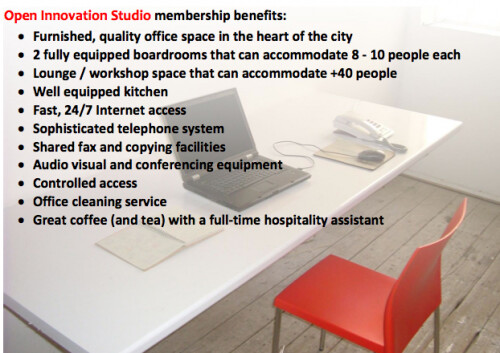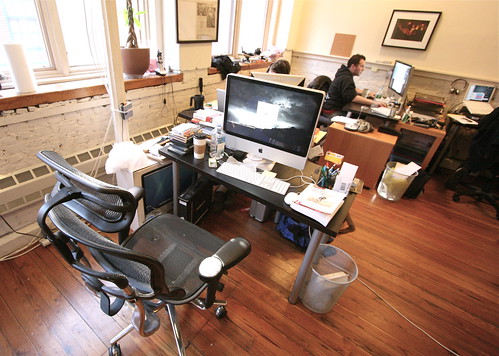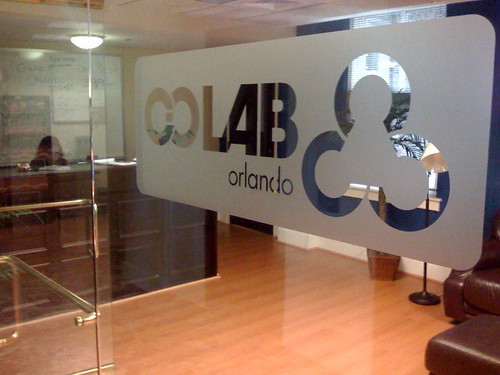African techies need community spaces. In Africa it makes sense to have this be part coworking space and part business and idea incubator.
A little background
There is an emergent, yet disconnected, technology community growing in many of the major African cities. The digital connection happens, primarily through email lists or message boards, and from time-to-time there are local physical meet ups, like the recent surge in BarCamps and other non-traditional meetings. What isn’t available is a place to meet that is always available and is made to engage and grow the community.
The VC, investor and business communities in Africa are beginning to see the value and need for web and mobile applications and services. At the same time these same individuals and organizations have no real avenue for engagement with the distributed and independent developer community. What they need is a hub, a place to go to find the young talent, invest in it, and offer monetary opportunities that re-invest in local technology growth.
These hubs would be tech community facilities in major cities with a focus on young entrepreneurs, web and mobile phone programmers and designers. It is part open community workspace (coworking), part investor and VC hub and part incubator. It is the nexus point for technologists, investors, tech companies and hackers in that area.
What it is
These hubs are community spaces that are open to all web and mobile phone developers. They are owned and supported by the local tech community and organizations that care about seeing this community grow.
It is an incubator, with an in-house investor who acts as advisor, who also helps to vette new entrepreneurs and ideas. It primarily operates off of a micro-VC model (a la Y Combinator) whereby approved entrepreneurs are given support for 3-6 months of work to create and launch their product or service. In that time, they are also given the chance to pitch the completed product to other investors, and are given support on business, licensing and legal issues.
It is where the young and old, new and experienced developers can go to hang out, learn from each other and work on joint projects. There is a real focus on making this open and available at those odd hours which hackers are prone to want to work in. It has a free high-speed internet connection, electricity, and an upbeat and fun environment to work in. It is where the local tech guys and user groups do their monthly and weekly meetings.
It is a coworking space, where freelance developers and designers can rent space (daily/weekly/monthly) and share common meeting rooms for business meetings. They are provided with spacious desks, high-speed internet access, conference rooms, a kitchen, unlimited network printing and faxing, couches and lounging area.
What it isn’t
It isn’t just a business. The end goal of the Innovation Hub in Nairobi is not to make money and be more profitable. Instead, it is to grow a stronger technology community in African cities, one where developers, designers, VCs and businesses are all better connected and mutually benefiting from the growth.
It isn’t a place for an outside sponsor to slap their brand on and call their own. This steals ownership from the local tech community and defeats the purpose of the facility.
Examples in action
They look different in every city, they take on the personalities of the communities that support them, and
(full list of known coworking spaces around the world)
There are a couple South African coworking spots. The Open Innovation Studio just opened in Cape Town, and I know there are a couple other space like Habitaz in Johannesburg.
There are quite a few running around the US right now. The most famous coworking spaces are Independents Hall in Philadelphia (run by my friend Alex) and Citizen Space in San Francisco (run by Chris and Tara).
In Orlando, Colab just opened, which I visited today to get a feel for the space. And just recently, my friend Mark Grimes opened up NedSpace in Portland, Oregon.
The Hub is a chain of coworking spaces, you can find one in Cairo. The image above is from their London facility.




January 14, 2009 at 8:38 pm
There’s something in there because Tracy and I were just talking about this this week! It’s another idea for those tech-centric African Diaspora can take up.
For starters, it involves two business sectors that ever evolving and maturing: real estate and technology. An investment in both is a win-win, if done right! Good post!
January 14, 2009 at 11:54 pm
I love it when things coalesce like that! I love the co-working space concept… and you are right places in Africa, like Kampala are ripe for this kind of shared space. A place that will provide shared resources but also a place to hone ideas and an opportunity to learn, grown and with any luck succeed. Love it.
January 15, 2009 at 6:01 am
I recently presented this idea in a more modified context, and several people were keen. One of our intended partners discovered that if they were to take this concept on, it would assist them as a lead for emerging technologies that were coming out, and integrating them into their business processes. However, when it came into ownership of the concept, the pretty much had it in mind that whatever code was written in one of this facilities was theirs to own, without much credit to the author. Pretty much the kind of situation you had when you were in varsity which went that if you wrote src on varsity machines, the uni could claim it. Since they were not willing to compromise, we had to go our separate ways. That however is the evil that will present itself when you choose to go the partner route especially with big companies in Africa.
Build it on your own.
January 15, 2009 at 9:26 am
awesome, HASH. This is going in the thesis for sure.
January 15, 2009 at 10:06 am
If you’ve had a chance to talk to me in person, while in Kenya, over the last 4-5 months you probably would have gotten tired of me spouting all of this off. It’s been on my mind for quite a while, and it just needs to get done. Nairobi (like Accra and Kampala) is an obvious choice for this type of facility. It needs a little partnership funding to get off the ground, but then it has amazing upside for businesses, investors and most importantly the community of web and mobile devs at large.
@Kahenya – such a shame. It’s harder to get something like this going in Africa because most of the established businesses really don’t get the web/mobile space in the first place. That’s exacerbated by the fact that they don’t consider anyone having a job, unless they put on a suit and tie and go to city center for work. 🙂
January 15, 2009 at 5:19 pm
Hash, we had talked about this before. I intend to be in Nairobi either in March or April. What do we need to do to get one going man.?
January 21, 2009 at 4:13 pm
Have you ever tried Genius Executive Center ran by Harry Karanja? He was profiled in a Business Daily article back in August of 2007.
The link in the blog http://www.geniuskenya.com/ goes to a strange-looking site, though. I remember a very different look last year.
January 22, 2009 at 4:50 pm
… maybe we could encourage Zanzibits to be more open … So we would have a space in Zanzibar, Tanzania … I will talk to Guy Mullens about it …
January 26, 2009 at 8:49 pm
Thanks for posting about this, HASH! It is great to read about the ever-expanding world of coworking. After having visited places like Nairobi and Kampala I will chime in with others and agree that these spots seem perfectly placed for coworking or coworking-like spots. For those of us who have experienced coworking spots (or started them up!), it is incredible to see what sort of things can happen when you put interesting, driven people into the same room. Cheers to you, and thanks for such a well-written piece.
February 1, 2009 at 5:55 pm
we have problems in zanzibar and we need to have a emergency plan … any ideas?
December 2, 2009 at 11:52 am
hi erik,
happy to read about your adventures back to nairobi. indeed there is so much potential to do such great things there. i have been inspired by jon and his work in kampala and see increasing interest to support initiatives in these efforts. mest in accra is another example that shows how far these things can go! good luck and i look forward to being in touch.
Ben
January 10, 2010 at 5:45 am
@Ben White – Very exciting times indeed. As you referenced, I’m back in Nairobi full-time to get the local innovation hub up and going. More news on that soon, but it’s going to be awesome!
April 17, 2010 at 9:20 am
That,s wonderful to initiate such a project in a city like Nairobi, as a varsity graduate we benefit and gain experience from such a facility.Kudos whiteman.
January 25, 2011 at 5:47 am
That”s exactly what Paris (France) has, a co-working space doubling as incubator, where quite a few geeks and entrepreneurs from Francophone Africa meet and host barcamps/meetings/start-ups, see http://lacantine.org/. BTW La Cantine welcomes formal or informal partnerships with any tech hubs in Africa.
October 24, 2011 at 5:13 am
For the attention of Hash
Hello Hash,
I am a French journalist based in Paris and am currently writing an article about coworking in Africa.
I mentioned what you said in your article and translated it in French : would you please have a look (and a say !) about what I wrote:
Selon whiteafrican.com, « ces hubs devraient exister dans toutes les grandes villes d’Afrique et se concentrer sur les jeunes entrepreneurs, les concepteurs et les programmeurs du web et de la téléphonie mobile. Ils devraient être organisés autour de trois axes : un espace de coworking pour la communauté, un lieu d’interaction avec les investisseurs et un incubateur. Ils doivent être de véritables pépinières pour les technophiles africains. Les investisseurs doivent agir en tant que conseils et repérer les idées et les entrepreneurs prometteurs. Il faut qu’ils s’engagent ensuite à soutenir le projet et l’équipe pendant trois à six mois en apportant les fonds de départ, selon un modèle de micro capital risque ».
Could you also provide me with a name for the quote (if it’s not out of the line !)?
If you wish to discuss this subject or have a link to the post, please let me know!
Best regards,
Nicolas